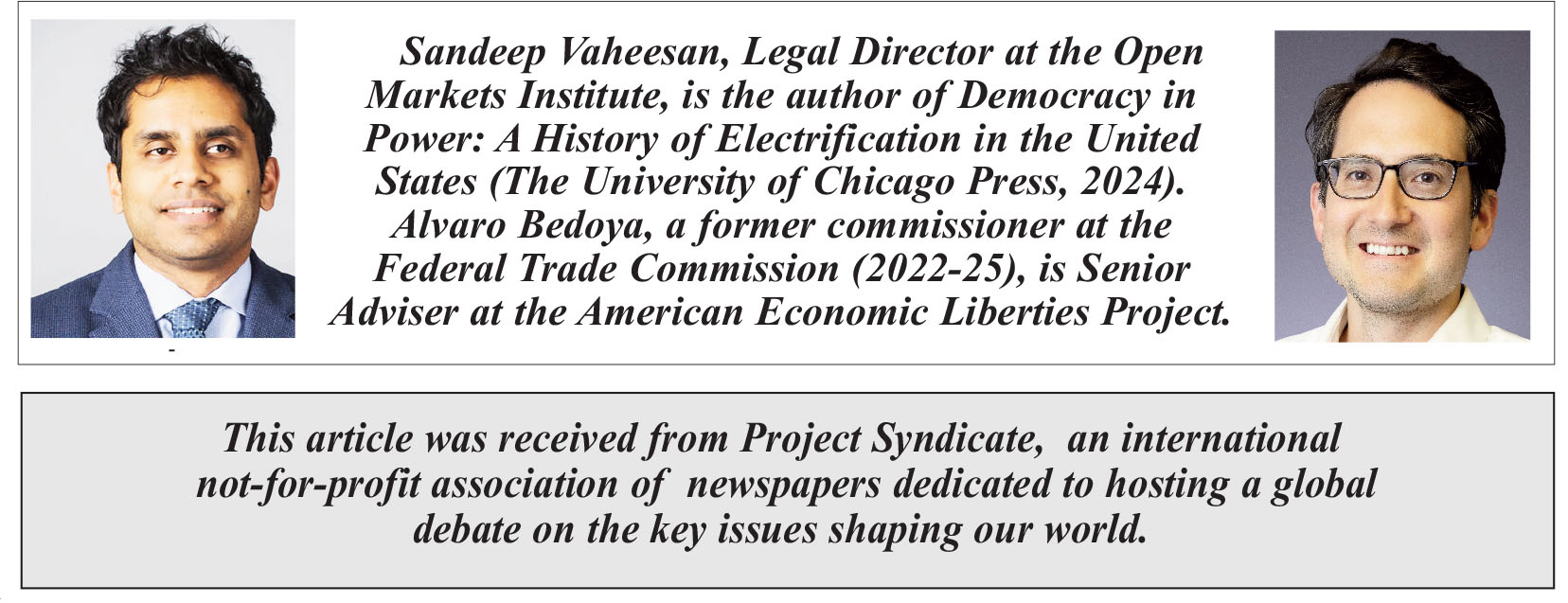Copyright stabroeknews

By Sandeep Vaheesan, Alvaro Bedoya WASHINGTON, DC – US President Donald Trump won the 2024 election partly on the promise of a new “golden age” for American workers, protecting them from the forces that have been eroding their livelihoods and well-being. But while Trump has taken action on this front, all of it has been against workers. Upon returning to the White House, Trump indefinitely suspended the US Occupational Safety and Health Administra-tion’s heat-safety regulations, even though extreme heat contributes to an estimated 600-2,000 worker deaths annually. His administration also quietly scuttled former President Joe Biden’s efforts to secure overtime pay for millions more workers. In August, Trump issued an executive order eliminating many federal workers’ collective-bargaining rights. And last month, his administration dashed hopes that working people would be freed from non-compete clauses. Tens of millions of workers in the United States, in nearly all lines of work and at all income levels, are bound by clauses impeding their ability to leave their jobs. In public comments to the Federal Trade Commission in 2023, workers shared harrowing stories of such clauses keeping them trapped in low-paying, unsafe, or hostile work environments and preventing them from pursuing their entrepreneurial dreams. Doctors told the FTC that non-compete clauses had forced them to move or leave the state just so they could practice medicine. One nurse-practitioner, who experienced workplace discrimination on account of her pregnancy and maternity leave, wrote that her work contract’s non-compete clause made her feel like a “prisoner” at her job. Many respondents expressed fear of legal consequences if their boss discovered they were looking for new work. In fact, the FTC found that non-compete clauses depress labor-market mobility even when employers did not and could not enforce them in court; the mere threat of legal action is often enough to intimidate workers into staying. Beyond the mental anguish, this leads to lower wages, depressed income growth, and less entrepreneurship. Firms claim that non-compete clauses are essential to protect their business. But they can use different laws to safeguard trade secrets, customer relationships, and other proprietary information. And, of course, they can retain workers by offering attractive wages, benefits, and good working conditions. But why would an employer do that if they knew they could retain those workers with the far cheaper threat of a non-compete? Enabling existing firms to hold workers hostage with non-compete provisions hurts not only the workers, but also newer businesses seeking qualified employees to help them grow, innovators attempting to develop the next big thing, and consumers. Of the 26,000 public comments the FTC received on the rule it proposed in January 2023, more than 25,000 supported its plan to prohibit non-compete clauses. So, in April 2024, the FTC enacted a rule doing just that. By abolishing existing non-compete clauses for nearly all workers, and barring employers from using them in the future, the FTC freed millions of Americans from a powerful constraint on their labor-market mobility. It also freed itself from an interminable game of worker-protection whack-a-mole, in which it must individually sue each employer using non-compete clauses. But employer groups fought back, filing multiple lawsuits to stop the rule from taking effect. They lost in a federal court in Pennsylvania in July 2024, but won a case in Texas the following month, thereby getting the rule put on hold nationwide. Now, even as he channeled Trump and pledged to deliver a “golden age for American workers” in January, FTC Chair Andrew Ferguson, with the support of his two Republican colleagues, has decided to stop defending the rule on appeal. Ferguson says the rule is “unlawful six ways from Sunday,” but this could not be more wrong. In fact, the FTC’s non-compete ban is anchored in law and evidence. The FTC Act expressly gives the agency the power to write competition rules, and a federal court of appeals once wrote that the FTC’s rulemaking authority is “as clear as it is unlimited.” The FTC rule has historical support as well. Contracts that prevented people from practicing their occupation were among the original “restraints of trade” in American and English common law. In 1949, the federal judge Learned Hand, widely considered the greatest judge never to sit on the Supreme Court, wrote that federal antitrust laws “certainly forbid all restraints of trade which were unlawful at common-law,” one of the “oldest and best established” of which is a “contract which unreasonably forbids any one to practice his calling.” The FTC rule follows this long legal tradition of protecting workers from employer coercion. Ferguson asserts that the rule against non-compete clauses violates the US Constitution’s prohibition on Congress delegating its legislative power to others – a doctrine that conservative lawyers and judges love to cite nowadays. But Congress has been delegating policymaking power to executive-branch officials and agencies since America’s founding, because they possess the relevant expertise and can respond to changes in economic, political, and social conditions faster than Congress can. In the entirety of US history, the Supreme Court has struck down only two statutes as improper delegations – both in 1935. As the legal scholar Cass Sunstein noted in 2000, the nondelegation doctrine has “had one good year, and [236] bad ones (and counting).” The FTC’s ban on non-compete clauses was one of the biggest national-policy wins for US workers in recent years – and, because of Trump’s FTC, it may never take effect. While not all is lost – bans are in effect in California, Minnesota, North Dakota, and Oklahoma, and a few other states may follow suit – millions of Americans are now doomed to remain shackled by non-compete clauses for the foreseeable future. Copyright: Project Syndicate, 2025. www.project-syndicate.org



